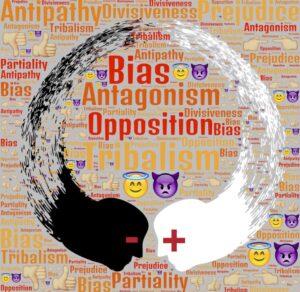 Everyone has biases. The only thing worse than having a bias is not realizing that you do. It is in the knowing that there is opportunity to manage unintended bias.
Everyone has biases. The only thing worse than having a bias is not realizing that you do. It is in the knowing that there is opportunity to manage unintended bias.
Humans are designed to crave relatedness. Millions of years ago your tribe was key to survival. Quickly recognizing those in or out of your tribe had life and death consequences. The wiring to recognize in-groups and out-groups is still in the brain. Neuroscience provides insights into bias, how it impacts behavior; and what can be done to manage it.
When you are with your in-group, your brain responds favorably.
• Others in the group remind you of yourself (the vmPFC – in your brain – activates);
• If a positive event happens to an in-group member, your brain’s reward region activates;
• If a painful event happens to an in-group member, your brain’s pain region is activated.
In a study with happy couples, one person watched as their partner received a mild shock. The brain of the watching partner activated to a similar degree as the shocked partner.
In short, your brain is wired to empathize with in-group members.
The opposite happens for out-group members. If a painful or positive event happens to an out-group member, your brain is not activated. The brain is not wired to empathize with the out-group. This in-group/out-group activation happens seamlessly and with minimal effort.
The implications at work are far-reaching as in-groups and out-groups form easily. Consider:
• Companies with offices in separate locations where employees rarely relate in person;
• Companies in a merger particularly if they were former competitors (definitely an out-group); or
• Technical staff attempting to persuade politicians through logic alone with no relationship.
Of course, there are the in and out groups that form around ethnicity, gender, age and status (employee/manager).
For example, consider technical fields where women are a minority (an out-group). From the research, we see that men naturally and unconsciously relate more easily to other men. General similarities in background, expectations and interests reinforce the in-group wiring. If a member of the male in-group receives an award or gets a promotion, it activates reward circuits in other in-group members. Not so if an out-group member (a woman in this example) receives an award or promotion.
Researchers for Harvard Business School’s Gender Initiative note that, more men than women tend to be managers in technical fields, and more men than women tend to be promoted into management. They found when a female employee clocks out before the work-culturally acceptable time, her colleagues are more likely to think: “She’s probably off to pick up her kids.” If a male employee checks out early, they may think: “He’s off to meet clients.*” Due to brain wiring, men are less likely to empathize with the women. Further, men (and women) naturally incline to hire/promote/want to work with in-group members.
What can be done? Are we doomed to be a slave to the brain’s inclinations? No. Here are four ways to counteract unintended bias.
1. Common interests. Find similar interests such as a home state, common university, kids of the same age, or a sports team. If you make the effort, you will find a foundation for a connection.
2. Shared goals and projects. The brain responds well to a common goal and the rewards that come with achieving it. I worked on transportation projects in Atlanta for the 1996 Olympics. That common goal forged a highly connected team that endures to this day.
3. Fun and laughs. Throw an office party (and don’t talk about work). See a funny movie together. Work on a common volunteer effort. Giving back to the community activates the reward center and creates a shared feel-good experience.
4. Gratitude. Research shows that expressing gratitude engenders relatedness for both the giver and receiver. It doesn’t get any easier than that.
It is easy to relate to in-group members but relatedness can also happen with out-group members. It just takes energy and effort. Individual and organizational success makes it worth the effort. Plus, it’s more fun.
*Paquette, Danielle, Mothers likelier to be judged at work, Washington Post, June 11, 2015.





0 Comments